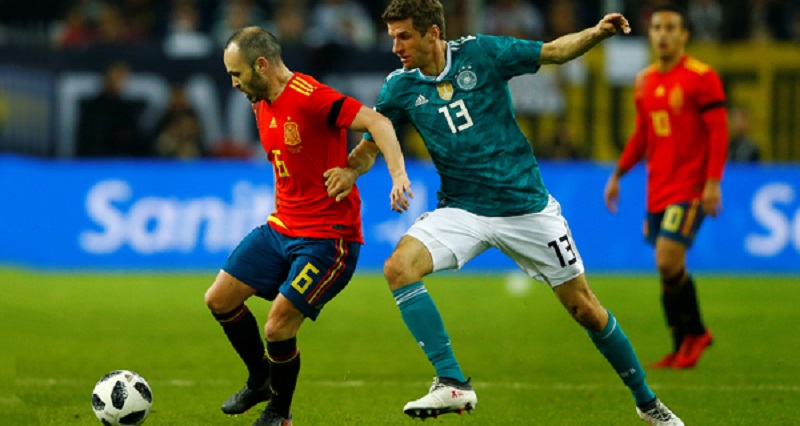
Andres Iniesta may be considering international retirement and winding down his club career in China but Spain’s creator-in-chief demonstrated on Friday why he might be leaving too soon.
Iniesta’s threaded pass in the sixth minute, disguised by a contradictory glance and weighted so precisely that Rodrigo Moreno was even spared a controlling touch, was not one of a player struggling to keep up.
This was Germany and the defence of the world champions, whom Spain could face again in the semi-finals at the World Cup, where Iniesta’s craft, eye and experience could prove similarly precious.
By the summer, Iniesta will be 34, perhaps about to trade La Liga for the Chinese Super League, where, he has said, he has an offer. He will decide by the end of April whether to call time on a glittering 16-year career at Barcelona.
“I don’t want to be around just because of who I was,” Iniesta told Spanish radio station Cadena SER on Thursday.
Barca would miss him, even with Philippe Coutinho – his anointed successor – in place, but perhaps the greater loss would be felt by Spain, for whom no player has been more instrumental over the last decade. Iniesta played in all the victorious finals — 2008, 2010 and 2012 — scoring the winner in one and claiming man-of-the-match in two.
All distinguished careers come to an end but few among the sold-out crowd in the Espirit Arena in Dusseldorf could argue that Iniesta does not have more to give.
His key contribution did not prove decisive, cancelled out by a superb 25-yard shot from Germany’s Thomas Muller in a 1-1 draw that pointed to two sides ready to go deep in Russia.
Spain are unbeaten in 17 matches under coach Julen Lopetegui. The former Rayo Vallecano goalkeeper hardly revolutionised this talented squad but made tweaks and gradually restored belief following the disappointments of 2014 and 2016.
“Spain senses its rebirth”, crowed Madrid daily AS on Saturday, signing off with the bullish conclusion that “we have sent a message we are equal to the champions”.
– Creative vigour –
It was certainly an encouraging Spanish display, high on energy, purpose and creative vigour, even if perhaps lower than expected on resilience and defensive steel without the injured Sergio Busquets.
In his absence, it was a brave call from Lopetegui to place Thiago Alcantara alongside Koke and Iniesta in an expansive midfield three. Villarreal’s Rodri, a more cautious option, came off the bench late on.
Isco showed again that he plays better in the Spanish red than the white of Real Madrid while David Silva’s place off the left of the attacking trio is surely assured.
It is the central striking position, left vacant by Fernando Torres and David Villa 10 years ago, where Spain remain without a stand-out first-choice.
Diego Costa is the most likely incumbent but he has not convinced at the last two major tournaments and instead, Valencia’s Rodrigo Moreno was handed the starting berth on Friday.
He took his chance, converting Iniesta’s pass with a crisp early finish, and Moreno has the advantage too of history with Lopetegui, under whom he won the Under-21 European Championships in 2013.
So too does Alvaro Morata, left out of the latest squad entirely because of his faltering form at Chelsea, although it would still be a surprise if he did not make the final list.
Iago Aspas, the former Liverpool forward and Spain’s highest scorer this season with 16 goals for Celta Vigo, is another option. He may be given a chance to stake a claim against Argentina at the Wanda Metropolitano on Tuesday.
Silva is unlikely to be available after the midfielder withdrew from the squad on Saturday for personal reasons. – Agence France-Presse



































